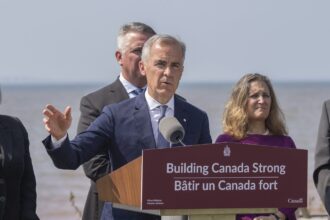In an unprecedented move that has sent shockwaves through Alberta’s medical community, the provincial government’s recent decision to implement fees for COVID-19 vaccines has triggered fierce opposition from the Alberta Medical Association (AMA). The organization, representing thousands of physicians across the province, has issued a formal statement condemning the policy, arguing it creates dangerous barriers to essential preventive healthcare.
“This decision fundamentally undermines public health principles that have guided our pandemic response for years,” said Dr. Margaret Thompson, President of the AMA, during an emergency press conference in Edmonton yesterday. “Charging Albertans for COVID-19 vaccines directly contradicts evidence-based approaches to maintaining community immunity.”
The controversial policy, scheduled to take effect next month, would make Alberta the first Canadian province to shift COVID-19 vaccination costs directly to patients. Under the proposed framework, residents would face fees ranging from $30 to $75 per dose, depending on vaccine type and administration location.
Health officials from the provincial government have defended the move as a necessary budget-balancing measure in post-pandemic healthcare management. Finance Minister Jordan Walker cited “unsustainable healthcare spending” as the primary motivation, stating that “Albertans understand the need for fiscal responsibility as we transition COVID-19 protocols into our regular healthcare framework.”
However, an analysis published by CO24 Business last week revealed that vaccine administration costs represent less than 0.3% of Alberta’s total healthcare budget, raising questions about the financial necessity of the policy change.
The medical community’s concerns extend beyond financial considerations. Dr. Emily Chen, infectious disease specialist at the University of Alberta Hospital, warns that introducing financial barriers to vaccination could have far-reaching consequences.
“We’re already seeing declining vaccination rates nationwide,” Dr. Chen explained in an interview with CO24 News. “Adding cost barriers virtually guarantees lower uptake, potentially leading to preventable outbreaks, especially among vulnerable populations and lower-income communities.”
Public health experts have pointed to extensive research demonstrating that even modest financial barriers significantly reduce preventive care participation. A study published in the Canadian Medical Association Journal found that user fees for preventive services typically result in 30-45% decreased utilization among middle and lower-income populations.
The controversy has also sparked national attention, with federal health officials expressing concern about potential violations of Canada Health Act principles. Federal Health Minister Jean-Yves Duclos has requested an urgent meeting with his Alberta counterpart to discuss the implications.
“Provinces maintain significant autonomy in healthcare delivery, but certain foundational principles of accessibility remain paramount,” noted political analyst Samantha Reid in her CO24 Politics column. “This situation potentially creates a precedent-setting conflict between provincial budget authority and national healthcare standards.”
Several Alberta municipalities have already announced plans to create local subsidy programs should the provincial policy move forward. Calgary Mayor Jyoti Gondek stated her administration is exploring legal options to ensure residents maintain access to vaccines regardless of financial status.
As protests mount and medical professionals threaten collective action, the question remains: will Alberta’s government reconsider a policy that appears to prioritize short-term budget considerations over long-term public health outcomes? And more critically, how might this decision reshape the fundamental understanding of healthcare access across Canada?










